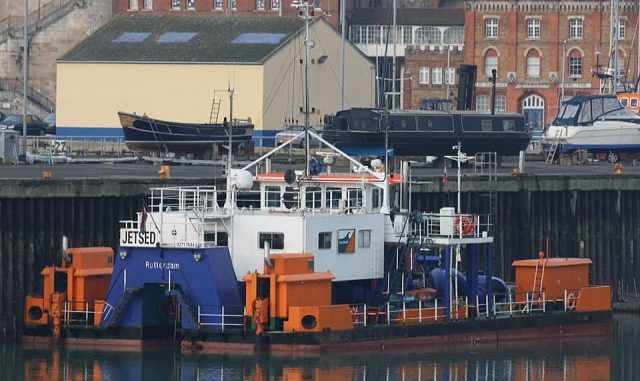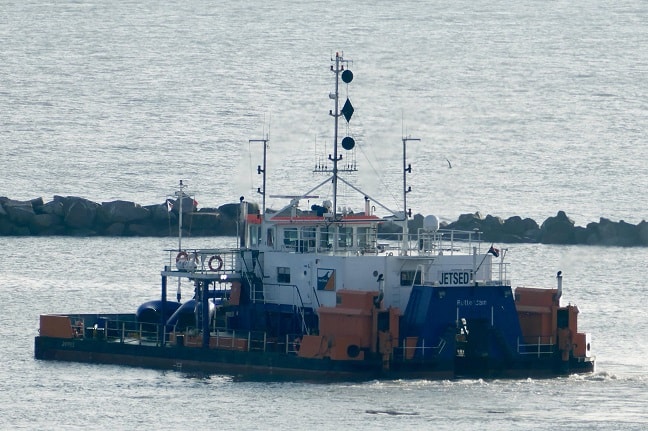
The Jetsed dredger is working at Ramsgate port for a second day as part of preparations for a potential ferry service.
Seaborne Freight, the firm that wants to operate a Ramsgate/Ostend route, says it is footing the bill for the work which began on January 3.
Seaborne Freight is one of three firms that has been awarded a government contract designed to provide extra ferry capacity to UK ports in the event of a no deal Brexit on March 29.
The others are French company Brittany Ferries, receiving £46m and DFDS with an award of £47m. Seaborne was awarded £13.8million although the government says no payment will be made until the service is in operation, which must be by March 29 when the UK exits the European Union.
The aim of the awards was to use UK ports to help alleviate pressure on Kent’s roads which would come with a ‘hard border’ and could lead to a backlog of traffic, particularly HGVs, trying to access Dover Port and the Eurotunnel. The ferry firms would add extra crossings to their timetables.
Questions raised
However, there has been widespread criticism of the Seaborne award as the firm is yet to announce the purchase or lease of any vessels for the service and it is not clear how it will be funded. A report in the Belgian press last year featuring Seaborne CEO Ben Sharp -listed as John Sharp on the company list of directors – claimed 10 haulage companies with a vested interest in supporting the ferry service would be backing the venture.
The Tradewind report claimed the costs of the start-up operation would be in the region of $100m, with all but $25m to $30m of the finance lined up.
Seaborne has been contacted for comment regarding funding and vessels. Previously a spokesman said: “We are not commenting on the vessels, either those for the launch or those for introduction at a later stage,” due to “commercial sensitivities.”
The port cannot currently accommodate the larger cross-Channel ferries due to the restricted size of facilities.
Dredging

The dredging is being carried out by the Jetsed, owned by Dutch company Van Oord. The craft is a water injection dredger, meaning it blasts holes in the seabed with a T bar and the mud and silt is then carried away by the outgoing tide. However, the method means the silt could settle in other areas of the harbour and there are questions over whether it can achieve the depth required in the timespan.
A previous dredge in 2010 -during the period of the TransEuropa service which eventually went into bankruptcy in 2013 –was carried out by Westminster Dredging with the silt sucked up and then deposited at two licensed dumpsites at Pegwell Bay and Dover.
Ferry service

Last week Seaborne said the ferry service would be running by late March with two craft, rising to four vessels by Summer.
A spokesman added: “A spokesman said: “During the development phase and pending the finalisation of robust funding arrangements, the business has been financed by the shareholders.
“This phase has included locating suitable vessels, making arrangements with the ports of Ostend and Ramsgate, building the infrastructure, such as bunkering, as well as crewing the ferries once they start operating. A work-up phase is part of the programme and training will be provided by a specialist organisation.
“The operational base is located in Folkestone where the Seaborne team is currently based, but will move to Ramsgate as soon as the port has been dredged and the facilities to operate the booking and loading services have been finalised.
“It was intended to start the service in mid-February but this has now been delayed until late March for operational reasons. This coincides with the Department for Transport’s Freight Capacity Purchase Agreement with Seaborne which is part of their preparations to increase ferry capacity in the unlikely event of a no-deal BREXIT.”
The Department for Transport said the firm had been carefully vetted before being allocated the contract and would be required “to meet a number of rigorous time-staged requirements” before any cash was handed over.
Despite Seaborne having no track record, some of the directors have worked in the maritime industry, most notably with MyFerryLink that ran crossings from Dover to France between 2012 and 2015.
Industry links
That company was set up following the demise of SeaFrance. The ships were leased to MyFerryLink by a workers’ co-operative, Scop SeaFrance, which in turn leased from Eurotunnel. This sparked a Competition Commission ruling which eventually led to Euotunnel not renewing the leases. This in turn led to workers strikes and their occupation of boththe MS Rodin and MS Berlioz in the Port of Calais. Ships were then sabotaged in protest of their impending lease-buy to competitor DFDS.
Seaborne directors John-Michel Copyans and Glenn Dudley were involved with MyFerryLink. Fellow directors Brian Raincock, Keith Jones and John Sharp are directors of Albany Shipping which is a “vessel operator in the offshore and oil and gas industry. It is also an Investment Advisor to a UK Shipping Fund,” according to the company website. According to the financial statements this company is dependent on loans from one of the directors who is currently owed £89,074.

